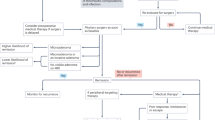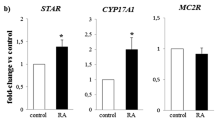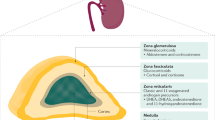Abstract
Extract: Six patients with the syndrome of congenital adrenocortical unresponsiveness to ACTH are reported.
This syndrome is characterized by feeding problems early in life, hypoglycemic episodes and hyper-pigmentation of the skin (table I). Blood pressure and levels of electrolytes in serum were normal (table II). PPD and histoplasmin skin tests were negative, while antibodies to adrenal, thyroid, and gastric tissues were undetectable. Urinary excretion of 17-hydroxycorticosteroids and cortisol production rates were low and did not respond to administration of ACTH (table III). While receiving a low sodium diet, the patients were able to conserve sodium (figs. 2, 3 and 4) and to increase the rate of aldosterone secretion (tables IV and V).
In one case, adrenal pathology showed a normal zona glomerulosa with atrophy of the zonae fasciculata and reticularis.
This isolated deficiency in cortisol secretion is not due to a defect in pituitary function or a deficiency of one of the enzymes directly involved in steroid biosynthesis. The most probable pathogenesis is an abnormality at the site (or one of the sites) of ACTH action on cortisol biosynthesis.
Speculation: It is probable that some young infants in whom a diagnosis of Addison's disease is made do, in fact, have the syndrome of congenital adrenocortical unresponsiveness to ACTH. Studies of cortisol secretion rates prior to and during ACTH administration and a determination of aldosterone secretion rates while receiving normal and low salt diets will permit differentiation of the two disorders.
Similar content being viewed by others
Log in or create a free account to read this content
Gain free access to this article, as well as selected content from this journal and more on nature.com
or
Author information
Authors and Affiliations
Rights and permissions
About this article
Cite this article
Migeon, C., Kenny, F., Kowarski, A. et al. The Syndrome of Congenital Adrenocortical Unresponsiveness to ACTH. Report of Six Cases. Pediatr Res 2, 501–513 (1968). https://doi.org/10.1203/00006450-196811000-00008
Issue date:
DOI: https://doi.org/10.1203/00006450-196811000-00008
Keywords
This article is cited by
-
Allgrove syndrome
The Indian Journal of Pediatrics (2007)
-
Mutations in MRAP, encoding a new interacting partner of the ACTH receptor, cause familial glucocorticoid deficiency type 2
Nature Genetics (2005)
-
Familial Glucocorticoid Deficiency Type 2 in Two Neonates
Journal of Perinatology (2003)
-
Familial adrenocortiocotropin unresponsiveness associated With alacrima and achalasia: Biochemical and molecular studies in two siblings with clincial heterogeneity
European Journal of Pediatrics (1995)
-
Adrenocorticotropic hormone insensitivity associated with autonomic nervous system disorders
European Journal of Pediatrics (1991)



